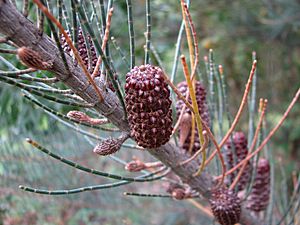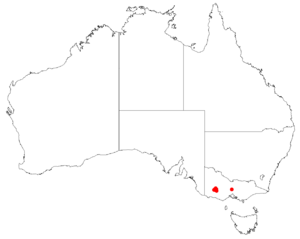Grampians sheoak facts for kids
Quick facts for kids Grampians sheoak |
|
|---|---|
 |
|
| Scientific classification | |
| Genus: |
Allocasuarina
|
| Species: |
grampiana
|
 |
|
| Occurrence data from AVH | |
The Grampians sheoak (scientific name: Allocasuarina grampiana) is a special type of shrub or small tree. It belongs to the Casuarinaceae family, which includes many sheoak trees. This plant is found only in one place: the Grampians National Park in Victoria, Australia.
About the Grampians Sheoak
The Grampians sheoak is a unique plant because it is endemic to the Grampians. This means it naturally grows nowhere else in the world. It prefers to grow on rocky sandstone areas within the park.
What it Looks Like
This sheoak can grow to be between 1 and 4 metres tall. That's about the height of a small car! It has long, thin, needle-like branches called branchlets. These branchlets can be up to 15 centimetres long. They often have a slightly waxy, bluish-white coating, which makes them look pretty.
Reproduction and Cones
The Grampians sheoak is a dioecious plant. This means that individual plants are either male or female. Male plants produce pollen, and female plants produce seeds.
After the female flowers are pollinated, they develop into small, woody cones. These cones are shaped like cylinders and are usually between 13 and 35 millimetres long. They are about 8 millimetres wide. Inside these cones, the plant produces small, winged seeds. These wings help the seeds to fly away from the parent plant when they are released.
How it Was Discovered
Scientists officially described the Grampians sheoak in 1989. A botanist named Lawrie Johnson was the one who formally named it. He studied plant samples that were collected from a place called Mount Rosea in the Grampians.

